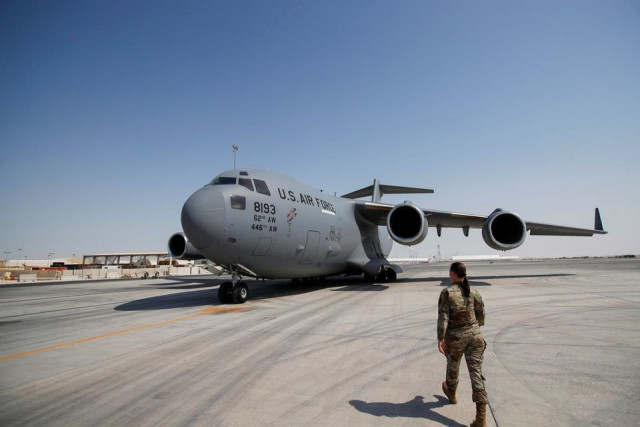US to operate massive humanitarian air bridge for flood victims
Twenty US C-17 military aircraft will land in Pakistan carrying food and shelter material worth $2.2 million

The United States will operate a massive humanitarian air bridge to Pakistan over the next 10 days to provide relief supplies to the flood-affected people, Counsellor of the US State Department Derek Chollet said on Thursday.
Derek Chollet, the special aide to US State Secretary Antony Blinken, told APP that the US remained steadfast in its support for affected communities across Pakistan through additional humanitarian assistance besides the already announced $30 million relief package.
Twenty US C-17 military aircraft will land in Pakistan carrying the food and shelter material worth $2.2 million as critical humanitarian assistance for flood response.
Read more: Saudi minister visits COAS, expresses grief over flood devastation
Counsellor Chollet, who led a US interagency delegation to Pakistan, earlier in the day met Prime Minister Shehbaz Sharif, Foreign Minister Bilawal Bhutto-Zardari and Chief of Army Staff (COAS) General Qamar Javed Bajwa.
Asked about the US announcement to work with the United Nations to raise $160 million for flood victims, Chollet said the US was approaching other countries and allies to meet the appeal of the UN Secretary-General.
He said that the US was committed to doing its part with its partners in the international community to help Pakistan respond to the terrible disaster.
Also read: UN secretary-general to reach Pakistan on 'solidarity' visit tomorrow
“The US wants to lead by example by helping the communities in Pakistan during difficult times,” he said.
The US through the US Agency for International Development (USAID) will coordinate with the local aid agencies for the distribution of relief goods and assistance.
Derek Chollet said that the US wanted to strengthen its defence relationship with Pakistan and also had a good partnership on counter-terrorism.
On the State Department’s decision regarding sustainment of F-16 military aircraft, he termed it “an important step in the military relationship with Pakistan.”
He said the Pak-US relationship was “broader and richer” encompassing trade, civil society and people-to-people relationships, flood relief, and reconstruction, and the largest Fulbright scholarship for students besides the bilateral and security ties.
On energy cooperation, he said that the US is helping Pakistan with the production of clean and green energy considering it a valuable future commodity for the globe.
He mentioned that as the US also suffered the brunt of climate change like wildfires, super storms, and drought, therefore it was committed to helping the countries like Pakistan to prevent such flood-like incidents happen again.
In commemoration of 75 years of diplomatic relations with Pakistan, Counsellor Chollet said his meetings with the Pakistani leadership and senior officials discussed a wide range of issues including improving trade and investment ties, defence ties, cooperation to mitigate the climate crisis, and expanding people-to-people connections.
Record monsoon rains and melting glaciers in Pakistan's northern mountains have brought floods that have affected over 33 million people and killed nearly 1,400, including children. The inundation, blamed on climate change, is still spreading.
Villagers near Manchhar lake fled their homes on Thursday due to rising flood waters. The disaster has estimated to have caused losses of about $10 billion, disrupting the lives of millions.
In Sindh, one of the worst-hit regions, people worked to strengthen an existing dyke as floodwaters threatened the town of Bhan Syedabad.
National disaster authorities said 12 deaths in the last 24 hours carried the toll to 1,355. Seven were children, who make up 481 of the dead.
In July and August, Pakistan got 391mm of rain, or nearly 190% more than the 30-year average, while Sindh got 466% more than the average.
The World Health Organisation has said more than 6.4 million people need humanitarian support in the flooded areas.



1725254039-0/Untitled-design-(24)1725254039-0-208x130.webp)















COMMENTS
Comments are moderated and generally will be posted if they are on-topic and not abusive.
For more information, please see our Comments FAQ